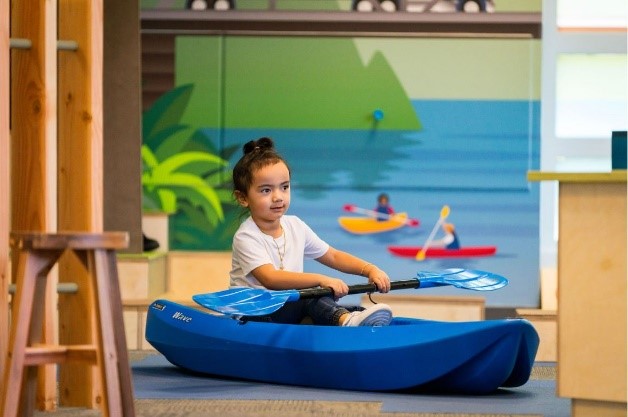About
The department has established an Incarcerated Individual Betterment Fund (IIBF). Assets of the betterment fund will be used solely for incarcerated individual betterment activities that enhance security and orderly operation of a facility by reducing idleness, encouraging positive development of family and community ties, and authorized expenses for incarcerated individuals.
Per RCW 72.09.470, to the greatest extent practical, all incarcerated individuals shall contribute to the cost of privileges. Contributions may be in the form of incarcerated individual's collective contributions to the institutional welfare/betterment fund.
The betterment fund, as called by the agency, will be maintained per the Office of Financial Management State Administrative and Accounting Manual (SAAM).
Budget
Per DOC 200.200 Incarcerated Individual Betterment Fund, revenue and expenditures will be documented and measured for tracking and financial status and determining budgets. Unspent budgeted funds from the previous fiscal year will revert back into the betterment fund balance.
Budget Committee
Per DOC 200.200 Incarcerated Individual Betterment Fund, two Statewide Family Council members with relevant experience (e.g., budget, finance, accounting) will be invited to attend and provide input during the review process for the agency budget.
Members
- Secretary
- Deputy Secretary
- Assistant Secretaries, as applicable
- Senior Director of Business Services
- Comptroller
- Business Strategy and Results Manager
- Financial Services Manager
- Betterment Fund Administrator
- Budget Director
- Other agency interested parties
Statewide Family Council Representatives
- Felix D'Allesandro
- Felicia Daniel
Budget & Quarterly Reports
Per DOC 200.200 Incarcerated Individual Betterment Fund, the Secretary will review and approve the final budget for the betterment fund each fiscal year and the betterment fund financial report will be updated and submitted quarterly for posting on the department's website.
- Incarcerated Individual Betterment Fund (IIBF) Annual Budget Report 200-RE018
- IIBF Quarterly Budget Report 200-RE005
- IIBF Facility Budget Narratives
- IIBF Facility Quarterly Budget Reports
Fiscal Year 26 Approved IIBF Budget Overview
Budget Assumptions/Proposed Changes
Revenue for Fiscal Year 2026 (FY26) was projected using the average monthly commissions from January through May 2025. A major change this year is the one-time legislative sweep from the IIBF to DOC’s base budget under HB 1468.
Beginning July 1, 2025, the IIBF will also transition from a local fund to a state treasury fund, known as the Institutional Welfare Account. As a result, the fund will no longer generate interest on deposits.
While these structural changes reduce available resources, the IIBF Budget Committee—composed of DOC staff and statewide family representatives—developed a balanced operating budget based on projected commission revenues from Securus phone and media services. The FY26 budget maintains core family-friendly and betterment programs and continues the per-incarcerated individual discretionary funding for facility-level activities.
Expenditures
Family-Friendly Investments
The total allocation for FY26 family-friendly programs remains consistent with prior years and continues to strengthen family connections and visitation opportunities.
Key investments include:
- Family-Friendly Events and Activities: Pre-planned programs hosted at prisons, reentry centers, and community justice centers.
- Lodging and Transportation Assistance Program (LTAP): Visiting a loved one can be costly, especially for families who have a significant distance to travel. To help ease this burden, the agency developed the Lodging and Transportation Assistance Program (LTAP) which provides an allowance for eligible visitors to visit their incarcerated loved one.
- Visit Room Photo Program: Provides free photos during visits to enhance the visitation experience, with additional funding to meet growing demand.
- Family-Friendly Supplemental Pop-Up and Enhancement Funds: Provide flexible funding for activities identified outside the formal budget cycle, with additional funds added this year specifically for reentry centers.
- FOSA Parenting Program: Funds classroom materials that support parents participating in the Family Offender Sentencing Alternative program.
Other IIBF Expenditures
Core contracted services and facility-wide betterment activities include:
- Motion Picture License: Ensures access to movie programming at all facilities.
- Satellite TV and Cable Fees: Provides consistent entertainment and educational channels through the statewide Sky Systems contract.
- Law Library Subscriptions and PC Lease: Supports access to legal resources and digital tools, including additional support for library enhancements.
- Facility EFV Consumables and Cultural Programs: Funds consumable items and cultural events related to Extended Family Visits separately from the $10 ADP allocation.
Special Requests (Planned Investments)
FY26 includes several approved one-time or specialized investments, including:
- Parenting Program for Women
- Parenting Inside Out Program
- Fatherhood Curriculum (Inside/Out Dads and 24/7 Dads)
- Reflooring of WCC EFV Units
- Tacoma Reentry Center Placeholder
- Holiday and Super Bowl Bags
- Additional Visit Room Photo Program Funding
Facility Discretionary Fund
Each facility continues to receive the $10 per incarcerated individual allocation for discretionary use.
Budget Outlook
The FY26 IIBF budget essentially balances revenues and expenditures. The apparent shortfall is due solely to a one-time tablet-refresh adjustment from prior years. Without this deduction, FY26 revenues and expenses would be in balance.
The fund is projected to close FY26 with an estimated $5.9 million balance, ensuring a stable foundation for continued programming and future investments that promote the well-being of incarcerated individuals and their families.
In Summary
The FY26 IIBF budget reflects DOC’s ongoing commitment to using Betterment Fund resources responsibly and transparently. It sustains family-friendly initiatives, supports educational and cultural enrichment, and ensures that facilities continue to have flexibility through discretionary funding and targeted investments that improve the quality of life for those in DOC’s care.
Meetings & Materials
Per DOC 200.200 Incarcerated Individual Betterment Fund, the betterment fund financial status will be publicly reviewed quarterly.
The department will host a quarterly event live on Microsoft Teams to review agency-level betterment fund financial reports. These meetings will typically occur on the last Thursday of the month. Dates and times will be posted and are open to the public.
Upcoming Meetings
- Thursday, January 29, 2026 from 4:00 p.m. to 5:00 p.m.
- Thursday, April 30, 2026 from 4:00 p.m. to 5:00 p.m.
- Thursday, July 30, 2026 from 4:00 p.m. to 5:30 p.m.
- Thursday, October 29, 2026 from 4:00 p.m. to 5:00 p.m.
Past Meetings
- Thursday, October 30, 2025
- Thursday, January 30, 2025
- Thursday, October 24, 2024
- Thursday, July 25, 2024
- Thursday, April 25, 2024
- Thursday, January 26, 2024
- Thursday, October 26, 2023
- Thursday, July 27, 2023
- Thursday, April 27, 2023
- Thursday, January 26, 2023
- Meeting Agenda
- Thursday, October 26, 2022
- Thursday, July 28, 2022
- Thursday, April 28, 2022
- Thursday, January 27, 2022
-
- Meeting Agenda
- Meeting Video Recording
- Questions and Answers
- 2001 DOC Supplemental Budget (includes law library funding information)
Each prison facility business office will be available upon the request of the local family council to present the budget to actual financial reports at facility local family council meetings.
Frequently Asked Questions
What is the Incarcerated Individual Betterment Fund (IIBF)?
The Incarcerated Individual Betterment Fund (IIBF) is a special revenue fund administered by DOC and used solely for incarcerated individual betterment activities and programs at prisons that enhance the security and orderly operation of a facility. The program is designed to reduce idleness among incarcerated individuals and encourage positive development of family and community ties.
Where does the money for the fund come from?
Nearly 90% of the fund comes from commission collected from incarcerated individuals' phone calls. IIBF revenue is also collected from media data commissions, recycling fees, vending commissions and contraband.
Where does the money in the fund go?
RCW 72.09.095 directs that DOC transfer 25% of the total annual revenues and receipts received in each institutional betterment fund subaccount to the Department of Labor and Industries for the purpose of providing direct benefits to crime victims through the crime victims' compensation program.
Why has the IIBF been running a surplus recently?
The Federal Trade Commission had been signaling their interest in capping the amount that states can charge and recently voted to cap the amount states can charge for phone and video calling services. In anticipation of a sharp drop in IIBF revenue when the decision goes into effect in 2025, the agency has been saving judiciously and spending less. In addition, spending was severely curtailed during the Covid-19 pandemic as in-person family friendly events and visitation were temporarily suspended under health protocols. Further, the legislature created new funding in the general fund to eliminate IIBF paying for 28 staff positions. All of these factors combined to build a surplus over the past five years.

A child enjoys one of the updated prison visit rooms.
What is the process for requesting funds from the IIBF?
DOC staff take ideas generated at facilities, which may include items submitted by the incarcerated and their families, and determine which ones comply with the IIBF use requirements. The IIBF Administrator prepares a draft budget based on ongoing expenditures, family friendly activity proposals coordinated by the Correctional Services program, and any facility-generated requests. Two family members, selected by the Statewide Family Council, participate in budget discussions and deliberations along with DOC staff. Finally, a proposed budget/spending plan is presented to the secretary
As a part of a routine IIBF policy update, DOC is currently working with volunteer family members of the incarcerated to develop and implement a clearer and more standardized process that involves staff, families and incarcerated individuals.
Who is in charge of the fund and its allocation?
DOC's Secretary reviews and approves the final budget and decides which programs and activities to fund.

Group photo of the Kids United by Incarceration summer camp in 2023.
What are some examples of programs or activities funded by the IIBF?
- Satellite TV service for prison facilities
- Motion picture public performance licenses and movie program
- Family Friendly events and activities for prisons, reentry centers, and community based criminal justice centers
- Free photo program that gives families two photos taken during visitation
- Therapeutic gardens and beautification projects
- Kids United by Incarceration (KUBI) summer camp
- Lodging and Transportation Assistance Program
- Law library electronic resources and books
- Visitation room enhancements to make them more family friendly
- Wellness programs and recreational equipment for incarcerated individuals
- Funding for Extended Family Visit (EFV) unit furnishings and supplies
Can IIBF funds be used for capital projects?
No. DOC has determined that capital projects fall outside the scope and financial ability of IIBF spending due to their high cost, as well as a separate capital budget process to fund those projects. Also, the few million dollars available in the IIBF fund would not be nearly enough to cover the cost of most capital projects.
Resources
Policies
Below are Department of Corrections (DOC) policies that apply to the Incarcerated Individual Betterment Fund.
Laws & Regulations
Below are the federal laws, state laws (RCWs) and regulations (WACs) that apply to and/or relate to the Incarcerated Individual Betterment Fund.
Revised Code of Washington (RCW)
- RCW 43.88.195: As applicable to establishment of accounts or funds outside treasury without permission of director of financial management prohibited.
- RCW 72.09.095: As applicable to transfer of funds to department of labor and industries for crime victims' compensation.
- RCW 72.09.470: As applicable to incarcerated individual contributions for cost of privileges – Standards.
- RCW 74.18.230: As applicable to business enterprises revolving account.
Washington Administrative Code (WAC)
- WAC 67-35-160: As applicable to business enterprises revolving fund.
- WAC 137-36-040: As applicable to disposition of personal property.
Publications
Below are Department of Corrections (DOC) publications that apply to the Incarcerated Individual Betterment Fund.
- Incarcerated Individual Betterment Fund (IIBF) Annual Budget Report 200-RE018
- Incarcerated Individual Betterment Fund (IIBF) Supplemental Budget 200-RE032
- Incarcerated Individual Betterment Fund (IIBF) Facility Quarterly Budget Reports
- Incarcerated Individual Betterment Fund (IIBF) Quarterly Budget Report 200-RE005

